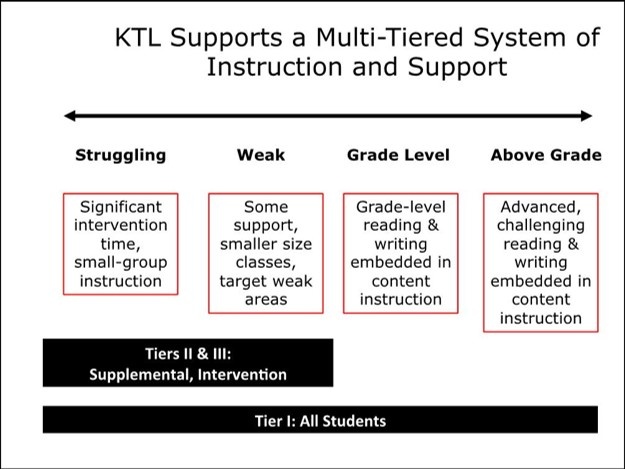What is MTSS?

MTSS stands for Multi-Tiered Systems of Support. MTSS is an instructional framework that includes universal screening of all students, multiple tiers of instruction and support services, and an integrated data collection and assessment system to inform decisions at each tier of instruction. The framework can be used for literacy, math, or positive behavior supports.
Over the past few years, a number of state-level departments of education have developed requirements for adoption of MTSS by school districts, as well as resources to help schools implement MTSS. As I work with districts to develop literacy plans, I am often asked to explain MTSS and how Keys to Literacy professional development support an MTSS literacy instruction model.
Is there a difference between RtI and MTSS?
“Response to Intervention” (RtI) and MTSS are sometimes used interchangeably among educators. The RtI framework was developed after the 2004 reauthorization of the Individuals with Disabilities Education Improvement Act (IDEIA). It offers an alternative path to identifying students as eligible for special education services from the older IQ-achievement discrepancy criteria. Therefore, RtI has traditionally had a special education focus. The emphasis in RtI is to provide effective instruction and intervention to reduce the number of students being referred to Special Education by providing evidence-based, high quality literacy instruction in all tiers.
MTSS, however, is a more recent and comprehensive framework than RtI. MTSS emphasizes multiple levels of instruction and support for all learners, including students with advanced skills or struggling students who may not be eligible for special education services. MTSS is typically a general education initiative that strives to ensure that practices, policies, and programs are aligned on classroom, school, and district levels. In addition to focusing on student support, MTSS emphasizes professional development and instructional support for general education and support staff who are delivering literacy instruction. MTSS is more likely to produce professional development that is aligned across a school and district. Finally, MTSS requires a greater collaboration between general education and special education within each school as well as between the school and the district.
How does Keys to Literacy support Rti and MTSS?
Keys to Literacy professional development supports RtI and MTSS literacy initiatives in these ways:
- Keys to Literacy teaching practices are designed to be used as Tier I instruction for all students in general education, content classrooms.
- General education teachers learn how to differentiate and scaffold instruction to accommodate students with a range of literacy skills and need for guided practice.
- Intervention educators (e.g., special education and reading teachers, para-professionals) learn how to provide supplemental, Tier II instruction to struggling students that includes more explicit instruction and guided practice.
- Participants in Keys to Literacy professional development learn how to use a number of comprehension, vocabulary, and writing activities as formative assessment to drive instructional decisions.
The visual below shows how Keys to Literacy instructional practices can be used to improve the literacy skills of a wide range of students.
How can I learn more about MTSS?
Visit the following websites for more information:
- Introduction to MTSS, then click on the links that give overview of Universal (Tier I), Secondary (Tier II), and Tertiary Level (Tier 3) of instruction


 Joan Sedita is the founder of Keys to Literacy and author of the Keys to Literacy professional development programs. She is an experienced educator, nationally recognized speaker and teacher trainer. She has worked for over 35 years in the literacy education field and has presented to thousands of teachers and related professionals at schools, colleges, clinics, and professional conferences.
Joan Sedita is the founder of Keys to Literacy and author of the Keys to Literacy professional development programs. She is an experienced educator, nationally recognized speaker and teacher trainer. She has worked for over 35 years in the literacy education field and has presented to thousands of teachers and related professionals at schools, colleges, clinics, and professional conferences.
Your theory is impressive but get a grip on how it really plays out in the actual classroom.